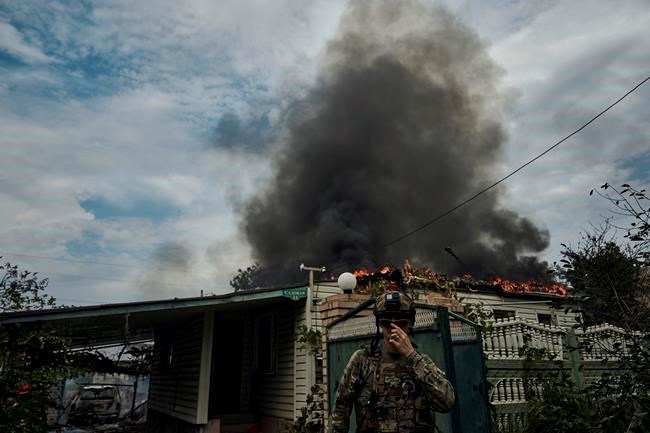OTTAWA — Canada's spy agency is leaning on Soviet imagery to help prime the public against disinformation but experts say Moscow is more likely to use images that make readers think the messaging is coming from North American sources.
Last month, the Canadian Security Intelligence Service started posting on social media about its efforts to counteract deliberately misleading information online.
The posts feature a font that resembles the Cyrillic alphabet, featuring stars instead of dots and the letter N appearing backwards. One posting features a Russian nesting doll, known as a matryoshka, with the words "Do you know who is behind it? Disinformation is here and hides well."
Another advises Canadians to "be aware of what you share" on social media, citing the risk of trolls.
Aaron Erlich, a McGill University political science professor, said it's important to make people aware of misleading information online. But he said the wording in the CSIS campaign was "not the most straightforward" and appeared as an attempt not just to educate but invoke fear.
Erlich said clumsy messaging can backfire and would like to know if the messaging was tested at all to see how it would be received.
In a statement, CSIS said the campaign is meant to inform Canadians of risks linked to multiple countries, and not just Russia.
"While this social-media campaign was evocative of Soviet imagery, the main goal of the campaign was to educate the public on the threats posed by all hostile state actors that often engage in hostile activities, such as clandestinely spreading disinformation targeting Canadians," wrote spokeswoman Lindsay Sloane.
The agency said that government and non-government actors exploit open democracies like Canada, particularly since the internet allows them to amplify messages that "interfere in healthy debate" and undermine confidence in institutions.
"As more Canadians transition from conventional media to a digital news environment, avenues to spread messaging have proliferated, and social media provides further channels of amplification," Sloane wrote.
Erlich, who has studied Russian disinformation, agreed with CSIS, saying the messaging often goes beyond legitimate debate and skepticism of politicians. Instead, Moscow's messaging aims to discredit the democratic process, by painting all politicians as corrupt and challenging core facts that underpin reality.
But he also said that Russia's disinformation attempts don't usually look like they come from Russia.
"The Russians in particular are very good at creating fake identities on Facebook of composite North American, Canadian, U.S.-based people, that look and feel like the people who are interacting … certainly don't seem to be coming from Russia," Erlich said.
Data collected by Rapid Response Mechanism Canada, an effort of Canada's foreign affairs department, backs that up, suggesting many messages supportive of Russia come through sites meant to resemble North American or European media.
The program supports the G7 Rapid Response Mechanism, an initiative to strengthen co-ordination to identify and respond to threats to the leading industrial democracies.
RRM Canada reports from early this year, which were obtained by The Canadian Press through the Access to Information Act, identify sites that are not overtly tied to the Russian state but are closely aligned with Kremlin narratives. They echo conspiracy theories and try to undermine countries' support of Ukraine.
The analysis focuses on what it calls "Russian Grey Media Websites" such as Global Research, a site registered in Canada that accuses the West of trying to "destroy Russia" by somehow causing Moscow to invade Ukraine.
That website summarized a session at the World Economic Forum meeting in Davos, Switzerland, last January, and analysts argued the site used selective quotes to suggest support for Ukraine will lead to a devastating world war.
For example, the website quotes Deputy Prime Minister Chrystia Freeland saying that a Ukrainian victory would be a "huge boost to the global economy." She was citing the conflict's effect on global trade flows. The website portrayed that comment as suggesting the West was fighting a war for the purpose of economic profit.
The analysis cites "conspiracies about globalization" that include allegations that secret groups discreetly fund international organizations like the World Health Organization, North Atlantic Treaty Organization and the World Economic Forum, with the aid of the U.S. Central Intelligence Agency and mainstream media.
One of the conspiracy theories claims that devastating earthquakes in Turkey and Syria in February resulted from "geophysical weapons" meant to punish Turkey for trying to maintain links with Russia.
The analysis also notes that these sites try to undermine the decision western countries made to send Ukraine military aid by arguing it comes at the expense of domestic programs. "There was a clear appeal to working-class people in western countries, stating that their political leaders are sacrificing their well-being," reads a Feb. 15 analysis.
It is difficult to know what sort of effect such narratives in cyberspace might have on a reader, because much depends on variables including the person's world view, said Tim Blackmore, a professor in the faculty of information and media studies at Western University in London, Ont.
Blackmore stressed the need for caution, skepticism and being slow to judgment about what they see and read.
"We need to settle into that and get out of the habit of saying, 'I must have the truth.'"
This report by The Canadian Press was first published Sept. 2, 2023.
Dylan Robertson and Jim Bronskill, The Canadian Press



